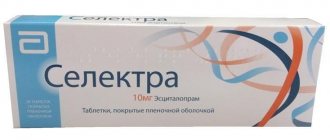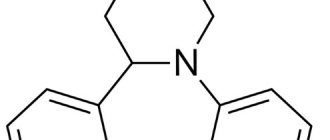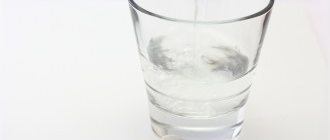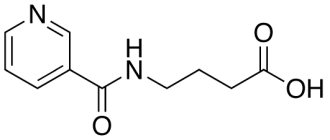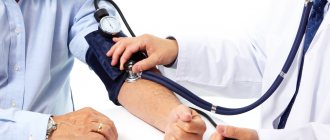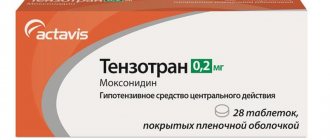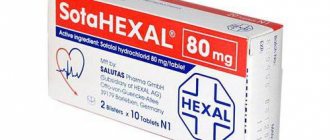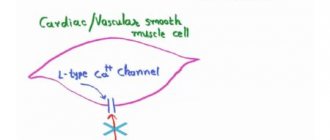Release form and composition
Aprovask is available in the form of film-coated tablets:
- Aprovask 5 mg + 150 mg: oval, biconvex, white, on one side there is an engraving “150/5” (7 pieces in blisters, 2 or 4 blisters in a cardboard pack);
- Aprovask 10 mg + 150 mg: oval, biconvex, pink, on one side there is an engraving “150/10” (7 pieces in blisters, 2 or 4 blisters in a cardboard pack);
- Aprovask 5 mg + 300 mg: oval, biconvex, yellow, on one side there is an engraving “300/5” (7 pieces in blisters, 2 or 4 blisters in a cardboard pack);
- Aprovask 10 mg + 300 mg: oval, biconvex, white, on one side there is a line and a bevel to it (7 pieces in blisters, 2 or 4 blisters in a cardboard pack).
Composition of 1 tablet:
- active ingredients: amlodipine (in the form of amlodipine besylate) – 5 or 10 mg; irbesartan – 150 or 300 mg;
- auxiliary components: hypromellose 6 mPa.s, colloidal silicon dioxide, microcrystalline cellulose 50 µm, microcrystalline cellulose 100 µm, magnesium stearate, croscarmellose sodium;
- composition of the film shell: white opadry (Aprovasc 5 mg + 150 mg and Aprovask 10 mg + 300 mg), pink opadry (Aprovasc 10 mg + 150 mg) or yellow opadry (Aprovasc 5 mg + 300 mg).
Analogs
There are quite a few functional analogues of Aprovask, but the most commonly used are:
- Exforge (Switzerland) - 1100 rubles;
- Amzaar (Korea) - 612 rubles;
- Valodip (Slovenia) - 415 rubles;
- Twinsta (India) - 408 rubles;
- Vamloset (Slovenia) - 201 rubles;
- Lortenza (Russia) - 133 rubles.
The cheapest and most accessible analogue of Aprovaska is Lortenza, which contains amlodipine and lasortan. According to their indications, these substitutes do not differ significantly from the action of Aprovask.
Contraindications
Absolute:
- unstable angina (except Prinzmetal's angina);
- cardiogenic shock;
- clinically significant aortic valve stenosis;
- simultaneous use with angiotensin-converting enzyme inhibitors in patients with diabetic nephropathy;
- simultaneous use with drugs that include aliskiren in persons with diabetes mellitus or moderate or severe renal failure;
- children and adolescents under 18 years of age (since the safety and effectiveness of the drug have not been established);
- pregnancy period;
- lactation period;
- hypersensitivity to the main or auxiliary components of the drug, as well as other dihydropyridine derivatives.
Relative (Aprovasc is used with caution):
- chronic heart failure 2-3 functional class;
- mitral and aortic valve stenosis or hypertrophic obstructive cardiomyopathy;
- coronary heart disease and/or clinically significant cerebral atherosclerosis;
- sick sinus syndrome;
- renal failure and the postoperative period after kidney transplantation;
- liver failure;
- hyponatremia and hypovolemia;
- conditions in which renal function depends on the activity of the renin-angiotensin-aldosterone system (arterial hypertension with renal artery stenosis of both kidneys or one kidney, chronic heart failure of functional class 3-4).
Drug interactions
It is not recommended to combine Aprovask with aliskiren and angiotensin-converting enzyme inhibitors, as there is a high probability of developing a sharp decrease in blood pressure, hyperkalemia and impaired renal function. The use of Aprovask in combination with: aliskiren is contraindicated - for diabetes mellitus, moderate and severe renal failure; angiotensin-converting enzyme inhibitors – for diabetic nephropathy.
The combination of the drug with potassium-sparing diuretics, potassium preparations and its salts can increase serum potassium levels.
The use of Aprovaska together with non-steroidal anti-inflammatory drugs in elderly patients can lead to the development of acute renal failure (it is necessary to periodically monitor kidney function).
The simultaneous use of irbesartan with lithium preparations can lead to an increase in the level of lithium in the blood plasma and its toxic effect (it is necessary to monitor the plasma level of lithium).
Directions for use and dosage
Aprovask is taken orally, regardless of food intake. The tablet should be swallowed whole with water.
As a rule, the initial and maintenance doses are 1 tablet per day.
Aprovask is prescribed to patients who are ineffective in monotherapy with amlodipine or irbesartan, as well as to those who are already taking amlodipine and irbesartan as separate drugs. The dose is selected individually, and amlodipine and irbesartan are first used separately. When selecting a dose, the response of blood pressure to the treatment and the target blood pressure value are taken into account. The maximum daily dose of the drug is 150 mg/10 mg or 300 mg/10 mg.
Patients with impaired renal function and the elderly do not require a dose reduction.
In case of liver dysfunction, Aprovask is prescribed with caution.
Overdose
If used incorrectly and independently increasing the dosage recommended by the doctor, a serious condition may develop.
Overdose symptoms
It should be taken into account that irbesartan and especially amlodipine in increased dosages can lead to reflex tachycardia, peripheral vasodilation, an increase in blood pressure reduction, and in severe cases, the development of a state of shock, even death. The patient is inhibited, his consciousness is confused, and in severe cases he may fall into a coma.
Treatment
Treatment of overdose symptoms is based on ensuring the maintenance of vital body functions and includes the following measures:
- a prerequisite is constant monitoring of the patient’s condition;
- if necessary, gastric lavage and activated charcoal are administered (immediately or no later than 2 hours after an incorrectly taken medication);
- amlodipine is closely related to blood proteins, and irbesartan cannot be removed from the body by hemodialysis, so it is ineffective in this situation;
- in case of a significant overdose of the drug, blood pressure measurement is required every 30–40 minutes;
- to increase blood flow to the brain, the patient should be placed in a position with elevated legs and monitor heart function and breathing;
- In addition, it is necessary to monitor the volume of circulating blood (CBV), as well as the amount of urine excreted.
In all cases, the patient is hospitalized for further therapy. In some cases, the administration of vasoconstrictors is required to normalize blood pressure and restore vascular tone. To eliminate the consequences of calcium channel blockade, intravenous administration of calcium gluconate is useful.
Side effects
Undesirable side effects observed during treatment with Aprovask:
- digestive system: often – swelling of the gums; uncommon – pain in the upper abdomen, nausea, constipation;
- metabolism: infrequently – hyperkalemia;
- respiratory system: infrequently – cough;
- cardiovascular system: often – orthostatic hypotension, palpitations; uncommon – excessive decrease in blood pressure, sinus bradycardia;
- nervous system: often – drowsiness, headache, dizziness; uncommon – paresthesia;
- sense organs: infrequently – vertigo;
- musculoskeletal system: uncommon – arthralgia, joint stiffness, myalgia;
- urinary system: often – proteinuria; uncommon – hypercreatinemia, azotemia;
- reproductive system: uncommon – erectile dysfunction;
- other reactions: often - edema, peripheral edema; infrequently – asthenic condition.
Undesirable side effects observed in clinical trials and post-marketing use of irbesartan:
- digestive system: often – pain in the upper abdomen, glossitis, nausea and vomiting, perversion of taste; uncommon – heartburn, dyspepsia, diarrhea; frequency unknown - hepatitis, jaundice, increased activity of liver enzymes;
- metabolism: frequency unknown – hyperkalemia;
- respiratory system: infrequently – cough;
- cardiovascular system: infrequently – tachycardia;
- nervous system: often – dizziness, headache; infrequently – orthostatic dizziness;
- sense organs: often – vertigo; frequency unknown – tinnitus;
- musculoskeletal system: frequency unknown – myalgia;
- urinary system: frequency unknown - renal dysfunction;
- reproductive system: uncommon – erectile dysfunction;
- skin and subcutaneous tissues: infrequently – baldness; frequency unknown – leukocytoclastic vasculitis;
- immune system: frequency unknown - urticaria, angioedema and other hypersensitivity reactions;
- other reactions: often – swelling, increased fatigue; infrequently – falls, chest pain; frequency unknown – asthenic state.
Undesirable side effects observed in clinical studies with amlodipine:
- digestive system: often – abdominal pain, glossitis, nausea, glossodynia; infrequently – dyspepsia, dryness of the mucous membranes of the oral cavity, changes in the rhythm of bowel movements, vomiting; very rarely - jaundice, hepatitis, gastritis, pancreatitis, gum hyperplasia, increased activity of liver enzymes;
- metabolism: very rarely – hyperglycemia;
- respiratory system: often – cough; infrequently – rhinitis, shortness of breath; very rarely – coughing;
- cardiovascular system: often - redness of the skin, hot flashes, palpitations; very rarely - cardiac arrhythmia, vasculitis, myocardial infarction, atrial fibrillation and ventricular tachycardia;
- nervous system and psyche: often – drowsiness, dizziness, headache; uncommon – mood lability, taste perversion, paresthesia, insomnia, syncope, tremor, hypoesthesia; very rarely - peripheral neuropathy;
- sense organs: infrequently – vertigo, visual disturbances, ringing in the ears;
- musculoskeletal system: uncommon – myalgia, muscle cramps, back pain, arthralgia;
- urinary system: infrequently – painful urge to urinate, increased frequency of urination, nocturia;
- reproductive system: infrequently – gynecomastia, impotence;
- skin and subcutaneous tissues: often – contact dermatitis; uncommon – baldness, itching, increased sweating, skin rash, purpura, changes in skin pigmentation; very rarely - exudative erythema multiforme;
- immune system: very rarely - urticaria, angioedema and other allergic reactions;
- hematopoietic system: very rarely - thrombocytopenia;
- instrumental data and laboratory parameters: infrequently - decrease or increase in body weight;
- other reactions: often - swelling, increased fatigue, peripheral edema; uncommon – asthenic condition, pain, feeling of malaise, chest pain; rarely – swelling of the face.
special instructions
Aprovask is a unique antihypertensive drug, the combination of components of which is not found in other drugs. Therefore, before prescribing it, you should carefully read the instructions and special instructions:
- It is important to consider that while taking Aprovasca, hyponatremia and hypovolemia are possible, which can provoke a sharp decrease in blood pressure, therefore the initial stage of treatment requires the administration of minimal doses of the drug;
- the metabolic rate of amlodipine decreases in liver diseases, which leads to a longer retention of its high concentration in the blood;
- sometimes irbesartan can provoke progression of azotemia and oliguria. Such reactions require mandatory supervision by the attending physician;
- the drug Aprovask is ineffective during a hypertensive crisis, therefore, to relieve such a condition, rapid-acting antihypertensive drugs are required.
The effect of the drug on driving and activities requiring quick reaction and concentration has not been established. However, taking into account its pharmacological properties, it is recommended to stop driving a car during treatment, as reactions such as dizziness, vertiligo and increased weakness are possible.
Storage conditions
Author-compiler: Vladimir Konev - doctor, medical journalist Specialization: epidemiologist, hygienist more details
Education: Graduated from the Sverdlovsk Medical School (1968 - 1971) with a degree in Paramedic. He graduated from the Donetsk Medical Institute (1975 - 1981) with a degree in epidemiologist and hygienist. He completed his postgraduate studies at the Central Research Institute of Epidemiology in Moscow (1986 - 1989). Academic degree – Candidate of Medical Sciences (degree awarded in 1989, defense – Central Research Institute of Epidemiology, Moscow). Completed numerous advanced training courses in epidemiology and infectious diseases.
Work experience: Work as head of the disinfection and sterilization department 1981 - 1992. Work as head of the department of especially dangerous infections 1992 - 2010. Teaching activity at the Medical Institute 2010 - 2013.
NOTE! Information about medications on the site is for reference and general information, collected from publicly available sources and cannot serve as a basis for making a decision on the use of medications in the course of treatment. Before using the drug Aprovel, be sure to consult with your doctor.
Modern pharmaceuticals offer a wide range of drugs for high blood pressure.
On the one hand, this is very good - everyone can choose the most optimal medicine for themselves, because they all have different effects and compositions. But on the other hand, a large selection leads to confusion.
What pills are there for high blood pressure, and which ones help best? Which ones are the strongest and which ones are the safest? And what do you need to consider in order to choose a truly effective remedy?

